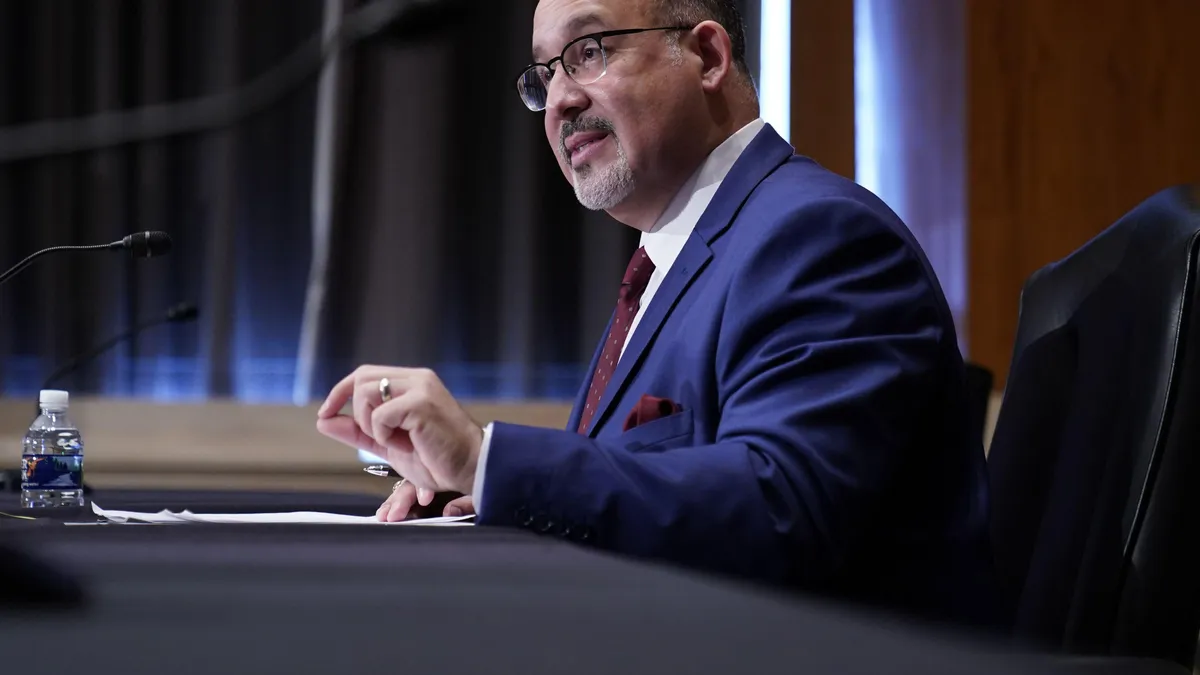Dive Brief:
-
The Senate on Monday approved Miguel Cardona, a longtime advocate for disadvantaged students and the former Connecticut K-12 schools chief, to serve as the 12th U.S. Secretary of Education.
-
Cardona sailed through the confirmation process in contrast to his predecessor, Betsy DeVos, with a final vote of 64 to 33.
-
Other recent appointees show the department's leadership team taking shape. James Kvaal, an Obama administration official, was nominated for the top position overseeing higher education.
Dive Insight:
President Joe Biden's selection of Cardona fulfills his pledge to pick an Education Secretary with a background working in public schools. Cardona became the head of Connecticut's K-12 schools in 2019, after many years as an elementary school principal.
He does not have extensive higher education experience, but was nevertheless lauded by many industry groups for his work helping students of color and those who are low-income. Cardona has had some exposure to postsecondary education as a University of Connecticut trustee, which gives him a "clear view" of institutions' challenges, American Council on Education President Ted Mitchell told Higher Ed Dive in December.
Prior to the vote, one of senators from Cardona's home state, Chris Murphy, a Democrat, praised Cardona as a consensus builder who was uniquely qualified to address the pain brought by the pandemic. Murphy drew attention to Cardona as a first-generation college student who returned after graduating to assist the vulnerable members of his community. Murphy recalled a story of Cardona as a teacher who spent hundreds of dollars of his own money ensuring his students had supplies.
"Miguel is made for this moment," he said.
Cardona has so far mostly enjoyed bipartisan backing, which was on display during his breezy confirmation hearing last month. He primarily faced criticism from a couple of Republican lawmakers for his support of legal protections for transgender students. During that session, Cardona stressed the need to support career and technical training, as well as two-year schools, referring to them as the country's "best-kept secret."
The administration is starting to fill out other top slots in the department's leadership slate. Notably, the White House nominated Kvaal — most recently the president of The Institute for College Access & Success — as under secretary of education. He will be the top official charged with crafting higher ed policy.
Terry Hartle, senior vice president of government relations and public affairs at ACE, said in a recent interview that Kvaal and other Biden appointees are "experienced and accessible."
Kvaal was deeply involved with the Obama administration's revamp of the federal student loan system and its regulatory crackdown on for-profit institutions. Hartle said he expects Kvaal will continue these efforts.
One of the department's most immediate tasks will likely be distributing $40 billion or so in direct relief money to colleges that would be made available through the coronavirus aid package Congress is expected to pass. While DeVos made past rounds of funding available quickly, the Trump administration also moved to restrict certain students from qualifying for aid, prompting several high-profile legal battles.
ACE and other higher ed groups have also pressed the Biden administration on a number of other initiatives: investing in historically Black colleges, doubling the Pell Grant, and assisting recipients of the Deferred Action for Childhood Arrivals program, which protects foreign nationals who came to the U.S. illegally as children from deportation. It also offers them options for education and employment.
Biden has already introduced a robust new immigration bill that creates new paths for unauthorized immigrants, including DACA participants, to secure legal citizenship.
Democrats are also eager to undo DeVos' rule governing how campuses should investigate and potentially punish campus sexual violence. Activists for sexual assault survivors argued the regulation reduced protections for victims, as well as the number of cases colleges would need to handle.
Several of the Trump administration's other education-related regulations are likely on the chopping block, though reversing them involves an intensive rulemaking process that could last years.















